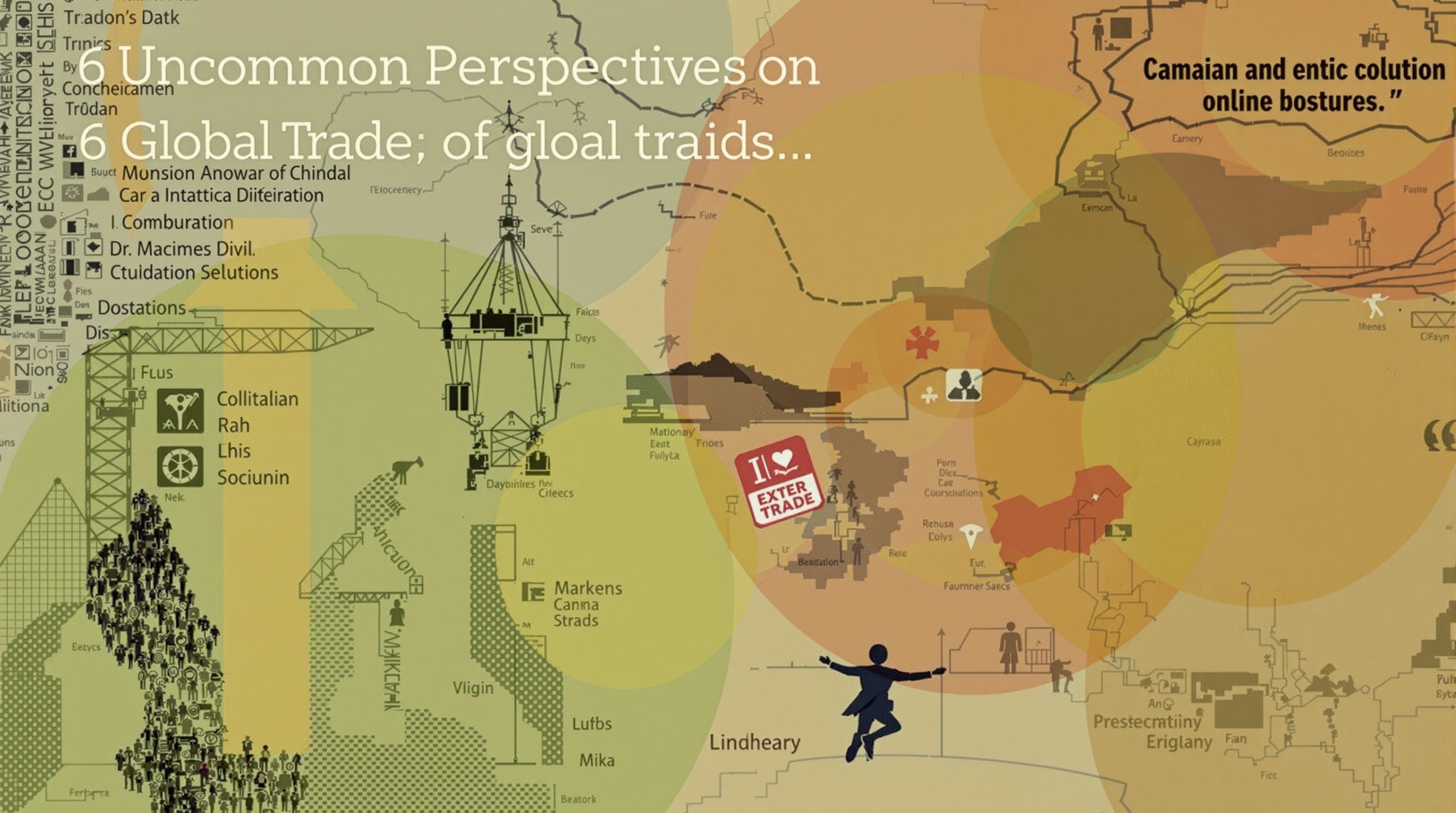Related Articles
- When Ancient Trade Routes Resurface: Unexpected Lessons for Modern Commerce and Global Economic Resilience
- When Artifacts Become Currencies: The Intriguing Trade Between Antiquities and Emerging Markets
- Beyond Borders: Unconventional Partnerships Transforming Trade Strategies in the Age of Globalization
- The Rise of Shadow Economies: How Informal Trade Networks are Disrupting Global Market Structures
- Cryptocurrency and Society: Understanding the Hidden Costs of Digital Assets on Community Well-Being
- The Surprising Role of Cultural Narratives in Shaping Investment Choices and Financial Preferences
9 Underappreciated Facts About Global Trade: 9 Unique Insights That Could Transform Your Investment Perspective Today
9 Underappreciated Facts About Global Trade: 9 Unique Insights That Could Transform Your Investment Perspective Today
9 Underappreciated Facts About Global Trade: 9 Unique Insights That Could Transform Your Investment Perspective Today
1. The Invisible Hand of Technology
Global trade has become increasingly influenced by technology, yet many investors overlook this crucial factor. The rise of e-commerce platforms and cloud-based logistics has revolutionized how companies conduct business globally. Innovations in artificial intelligence and blockchain are streamlining supply chains, reducing costs, and increasing transparency.
Furthermore, technological advancements allow for faster communication, enabling businesses to respond swiftly to market changes. According to a report by McKinsey, digital transactions now account for 20% of global trade, a figure expected to rise significantly in the coming years.
Investors should consider companies that are at the forefront of these technological innovations in global trade, as their potential for growth is immense. Understanding how technology impacts trade practices can provide a valuable edge in investment decisions.
2. Surprising Economic Ties Between Countries
Many economic relationships exist that aren't immediately obvious. For example, countries may have strong trading ties despite political differences or geographical distance. This surprising reality can create unique investment opportunities.
The United States, for instance, has substantial trade relations with countries such as China and Mexico, even amidst broader geopolitical tensions. Understanding these economic connections can reveal sectors poised for growth in times of uncertainty, as demand for specific goods may remain stable.
Investors should study a country's trading partners to uncover hidden potential. Effective investments can emerge from recognizing these unexpected economic alliances.
3. The Role of Emerging Markets
Emerging markets are often volatile, but they can also present substantial opportunities for savvy investors. Countries like India, Brazil, and Vietnam are becoming significant players in global trade, driving demand for various goods and services.
As these economies grow, their consumption patterns change dramatically. McKinsey predicts that by 2030, emerging markets will account for 50% of global GDP, emphasizing the importance of these regions in trade dynamics.
Incorporating emerging markets into your investment strategy can lead to remarkable returns, especially as they stabilize and integrate into the global economy.
4. Environmental Impact and Trade Regulations
Global trade is increasingly affected by environmental concerns, leading to stricter regulations. Countries are becoming more aware of the carbon footprints associated with transporting goods across borders, prompting a shift toward sustainable practices.
Investors need to watch for changes in trade policies that emphasize sustainability. For example, the European Union has initiated the Green Deal, which can significantly alter market dynamics for businesses that do not comply with environmental standards.
Companies that prioritize sustainability may gain a competitive advantage, making them more attractive investments. The shift towards green trade will create new markets and opportunities worth pursuing.
5. The Power of Trade Agreements
Trade agreements can transform markets by reducing tariffs and opening new channels for commerce. However, the effects of these agreements are often underestimated by investors. For instance, the US-Mexico-Canada Agreement (USMCA) altered how many businesses operate across North America, influencing trade flows significantly.
Understanding the nuances of trade agreements allows investors to anticipate shifts in market dynamics and allocate resources accordingly. Companies benefiting from reduced tariffs can gain a pricing advantage over competitors.
Investors should monitor existing and upcoming trade deals, as they can create lucrative opportunities across various sectors, from agriculture to technology.
6. Trade and Political Stability
Political stability plays a crucial role in global trade, often impacting investor sentiment. Wars, civil unrest, and policy changes can disrupt trade flows, but these events can also present opportunities for well-informed investors who can discern value amidst turmoil.
For example, conflicts may drive down asset prices in certain regions, enabling savvy investors to acquire undervalued stocks or commodities. Investors must stay informed about geopolitics and understand how these factors influence trade.
Ultimately, political stability should be a significant consideration when evaluating potential investment opportunities in global trade.
7. The Importance of Shipping Routes
Shipping routes are often overlooked despite their critical role in global trade. The cost and time associated with transporting goods by sea can be influenced by factors such as piracy, weather, and geopolitical tensions, affecting market prices significantly.
Investors must recognize the importance of maritime logistics and the shipping industry. Disruptions along established routes can shift trade patterns entirely, prompting buyers to seek alternative sources or routes.
Understanding maritime trade dynamics can provide insights into which industries will thrive and which might suffer in response to changing shipping conditions.
8. Cultural Nuances in Trade
Culture affects trade more than many realize, influencing consumer preferences and demand. Companies looking to expand into international markets must navigate local customs, languages, and buying behaviors to succeed.
Investors can benefit from acquiring knowledge about how cultural factors impact product success in various markets. Brands that resonate well with local consumers are more likely to flourish, making them attractive investment prospects.
By recognizing the importance of culture in trade, investors can identify and support companies with strong local connections and insights, ultimately leading to greater investment success.
9. The Rise of Reshoring
As a reaction to global supply chain disruptions, there is a rising trend toward reshoring—bringing manufacturing back to home countries. This shift has implications for global trade, affecting where businesses source materials and produce goods.
Investors should pay attention to industries that benefit from reshoring as companies stabilize their operations and seek local suppliers. This trend can lead to increased domestic production and job creation, potentially driving stock prices higher.
Understanding reshoring’s impact on trade dynamics can help investors make strategic decisions that capitalize on this evolving landscape.




